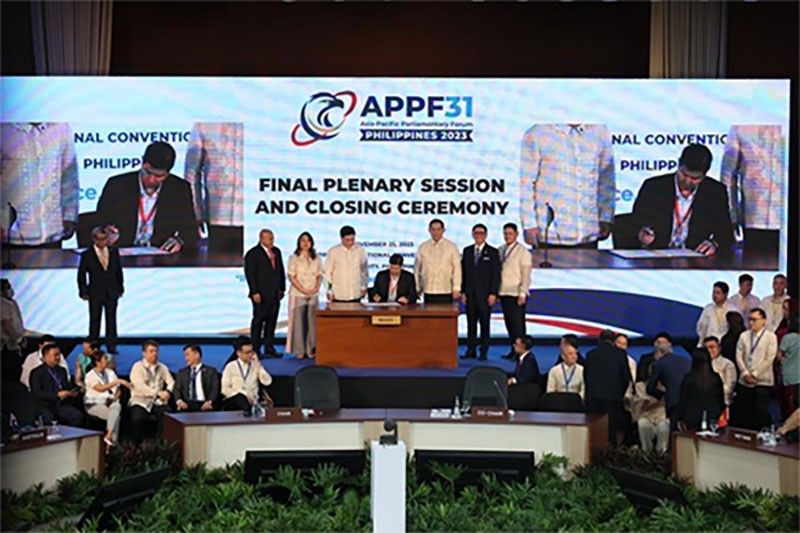AsPac signs communique on freedom of navigation

MANILA, Philippines — China has joined the 18 other Asia-Pacific countries in signing a joint communique recognizing freedom of navigation under the United Nations Convention on the Law of the Sea (UNCLOS) during the 31st Annual Meeting of the Asia Pacific Parliamentary Forum (APPF), which concluded yesterday.
Senate President Juan Miguel Zubiri and Speaker Martin Romualdez led the final plenary session and closing ceremony where they shook hands with the heads of delegation, including China, led by National People’s Congress (NPC) foreign affairs committee vice chairperson Wang Ke.
The other countries which signed the communique besides the Philippines and China are Australia, Brunei Darussalam, Cambodia, Canada, Chile, Indonesia, Japan, Republic of Korea, Lao PDR, Malaysia, Mexico, Federated States of Micronesia, Papua New Guinea, Peru, Russian Federation, Thailand and Vietnam.
Zubiri called the joint communique “historic” because China acknowledged the freedom of navigation in the seas under UNCLOS, as he expressed hope Beijing would stop its coast guard and maritime militia’s harassment of Filipino fisherfolk and vessels in the West Philippine Sea.
Asked if the joint communique will just be another paper victory and if it will finally put a stop to Beijing’s harassment, Zubiri said he hoped the member parliaments will go home to their countries with their shared vision for a peaceful Asia-Pacific region in mind.
“It is not an order or a law, but it carries a lot of persuasive weight. Will it be implemented? That’s a different story. But at the very least, we all came together to approve 10 resolutions for the betterment of our region,” Zubiri said in a press conference before the closing ceremony.
“We hope it will have some persuasive effect on their way home to their different parliaments,” he added.
In the joint communique, the APPF Member Parliaments “resolved to strengthen the capacity of parliaments to promote regional peace and stability” and “committed to increase their efforts in promoting and maintaining peace, security, stability, safety and freedom of the high seas, consistent with the 1982 UNCLOS.”
The inclusion of the UNCLOS was a result of the resolutions sponsored by the Philippines and Indonesia for “strengthening the capacity of parliaments to promote peace and stability” and for “enhancing maritime security cooperation in Asia-Pacific.”
The Indonesian resolution on maritime security was consolidated with the “Regional Peace and Stability” resolution, among the 10 resolutions adopted by the APPF plenary. The others are on the Korean peninsula, transnational crimes, gender and sustainable development goals, women’s participation and leadership, critical infrastructure, human capital development and regional cooperation on climate change, education and culture and universal health care.
Resolutions are adopted by consensus, meaning the wordings should be agreeable to all countries.
In the regional peace and stability resolution, the APPF parliaments are urged to support the 1982 Manila Declaration on the Peaceful Settlement of Disputes, which states that judicial settlement between states should not be considered unfriendly acts; the “international community’s vision of a world free of nuclear weapons” and “to work together to advance multilateralism as a framework for addressing security threats, as well as tensions and conflicts, through open dialogue (and) international cooperation,” among others. — Sheila Crisostomo
- Latest
- Trending
































